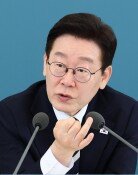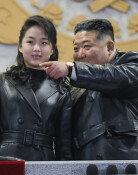U.S. Special Envoy Should Be Sent to Pyongyang to Strike a Deal before N. Korean Nuclear Issue Is Taken to UN Security Council
U.S. Special Envoy Should Be Sent to Pyongyang to Strike a Deal before N. Korean Nuclear Issue Is Taken to UN Security Council
Posted May. 08, 2005 23:57,
There are a growing number of intelligence reports and speculations that a North Korean nuclear test is imminent. The second North Korean nuclear crisis was initially brought about by the disclosure of the Norths uranium enrichment program in October 2002, escalated with Pyongyangs declaration of nuclear weapons possession on February 10, 2005, and is now on the verge of reaching a dead end. Professor Han Seung-joo of Korea University, who led negotiations and talks on the spot as foreign minister in the first North Korean nuclear crisis between 1993 and 1994, and as Korean ambassador to the United States in the second crisis, offers his own analysis on the pressing issue.
An Increased Possibility of a North Korean Nuclear Test-
Q: To get straight to the point: According to the estimates of Korea and the United States, how likely is a North Korean nuclear test?
A: So far, most people have thought that North Korea would choose not to make any nuclear tests, which hardly was politically advantageous for the North, as a possible North Korean nuclear test might lead to strong criticism from China and close consultations between Korea and the United States over the red-line and time-limit issues. Nevertheless, it now seems apparent that North Korea feels the need of establishing itself as a nuclear power. It is also likely that the North gained confidence in its own nuclear deterrence against the United States. In this vein, I believe the likelihood of North Korea making a nuclear test is very high. Pyongyang can simply conduct a nuclear test and say, We already declared that we had nuclear weapons.
Q: Do you believe the North Korean uranium enrichment program, the main cause of the second nuclear crisis, has already reached weapons grade?
A: The United States believes the North is on the verge of reaching weapons-grade enrichment, if it has not already done so. Uranium-based nuclear weapons are quite difficult to monitor, as they are harder to find and easier to manufacture than plutonium-based ones.
Q: It is widely known that the second North Korean nuclear crisis is much more serious than the first one. However, the Korean and U.S. governments have seemingly less sense of urgency. Is this because they have gotten more mature?
A: It seems that, undergoing the first and second nuclear crises, the two governments have acquired some immunity, rather than maturity. Indeed, the current situation is quite grave. However, both the Korean and U.S. governments are tending to underestimate the gravity of this situation. On February 10, when North Korea declared its possession of nuclear weapons, the fundamental position of the two countries was that the declaration was for negotiating purposes, while it was impossible to confirm whether North Korea actually had [nuclear weapons]. South Korea was concerned that the United States and other countries might overreact. For the United States part, acknowledging North Koreas enhanced nuclear capability meant its four-year policy toward the North had not been working. Nevertheless, Pyongyangs recent actions show that it is aiming at establishing its status as a nuclear power, rather than upping the ante for negotiations or drawing attention from the United States.
Differences between the First and Second Nuclear Crises-
Q: How different is North Korea from what it used to be in its first nuclear crisis?
A: In the first crisis, North Korea eventually suspended its nuclear development, but now it is trying to take this opportunity to secure nuclear capability to some extent.
Q: Many indicate that the North would not have succeeded in miniaturizing its assumed nuclear weapons enough to carry them on missiles.
A: It is obvious that [North Koreas nuclear attack] might fail to reach the U.S. mainland, but Japan or South Korea could also be its target for the time being. Ten years ago, chances were that North Korea could possess one or two nuclear weapons. Now it is possible that the North might have more. It is too early to conclude that it has nuclear warheads, but at the same time, we cannot say it does not. That is why Japan feels insecure.
Q: Former Democratic presidential candidate John Kerry said North Korea possessed six to eight nuclear weapons.
A: [The United States] estimates that the North has at least two to three nuclear weapons, or even possibly six to eight.
Q: There are some concerns that Korea and the United States are failing to cooperate with each other compared to the first nuclear crisis.
A: Many Americans say so. Not only Bush administration officials but also doves, who are critical toward President Bushs policy toward North Korea, often say: You need both carrots and sticksincentives and pressuresto make negotiations. However, South Korea does not allow any sticks to be considered. Under such circumstances, North Korea would not attempt to negotiate. At least in summer of 2003, the United States was unwilling to have any negotiations with North Korea, while South Korea was reluctant to put pressure on the North.
Limits to Chinese Influence on North Korea-
Q: Does China have an active willingness to resolve the North Korean nuclear issue? Chances are that it is actually using the issue as leverage against the United States with regard to the issue of Taiwan.
A: Some share such skepticism in the United States. Under my observation, however, China is not trying to link the North Korean nuclear issue to other ones ranging from Taiwan to US-China and Sino-Japan relations. The North Korean nuclear program itself is a threat to China. Furthermore, the Norths possible exportation of its nuclear weapons can justify potential nuclear buildups of Japan and other Northeast Asian countries.
Q: Some analysts say North Korea would have to surrender if China simply blocks Dandong, a channel for trade between China and the North.
A: China does have some ways to influence North Korea, but these measures are quite extreme ones. It is highly unlikely that China would actually use such measures. Indeed, North Korea is implementing its brinkmanship strategy towards China as well as the United States. China has three major objectives regarding North Korea: a) maintaining the North Korean regime; b) denuclearizing North Korea; and c) avoiding war on the Korean Peninsula. All the three objectives benefit China, but concentrating too much on one objective undermines efforts to achieve other objectives. That is why China needs a balance.
Time Limit for Solution and Six-Way Talks-
Q: At the current point, how useful are the six-way talks?
A: Usefulness will arise under the premise that North Korea has prepared to negotiate. Nevertheless, North Korea is probably thinking that it has passed the dangerous, weak point (for the possession of nuclear weapons).
Q: Even if North Korea returns to the six-way talks, wouldnt in reality only turn into behind the scenes negotiations between the US and North Korea?
A: The US thinks that it is irrational to be flexible toward North Korea before the six-way talks even begin. I think it will be effective for the US to send a special envoy to Pyongyang not for negotiations but for the purpose of making contact. However, North Korea has already declared itself as a nuclear power. If it proceeds to a nuclear test, the US will absolutely not send a special envoy to North Korea. That is because if the US does so, it will appear that it is yielding to North Korea.
Q: The Bush Administration has recently repeatedly mentioned the possibility of referring North Koreas nuclear issue to the UN Security Council.
A: The issue here is not whether the Security Council will impose sanctions or not, but whether North Korea will feel pressured in the process before that. In that aspect, China and Korea, will officially and superficially take a negative attitude toward taking the nuclear issue to the Security Council. Anyhow, if it is referred to the Security Council Chinas influence on North Korea will increase. That is because China can choose to help, or not to help North Korea in the Security Council. That gives China leverage on North Korea. Back in 1994, when North Koreas nuclear issue went to the Security Council, China told North Korea, it will be difficult to help if you dont come to negotiations, and made North Korea return to the negotiation table. I wonder how it will turn out this time?
Q: What other diplomatic efforts are left to persuade North Korea?
A: In my opinion, there are virtually none. Nowadays, I think even China has given up (diplomatic efforts). China probably has lots to ponder about now. And the US probably thinks that it has exhausted its diplomatic efforts toward North Korea.
Foreseen Situation in the Future-
Q: Is there any possibility of North Korea suddenly coming to the six-way talks?
A: There is a possibility but it is extremely unlikely. There are many negative factors. First, North Korea has gained confidence on its nuclear capability. Second, North Korea thinks that if it holds still, The Chinese and Korean moderate stance toward North Korea will dilute strong response from the U.S. Third, North Korea thinks that the U.S. invaded Iraq, not because Iraq had nuclear weapons, but because it did not.
Q: What about US attitude being important?
A: The US has its mid-term election in November next year. If the US pursues referring North Koreas nuclear issue to the Security Council, it will not delay until next year. President Bush, in his second term, will also not just sit by and watch North Korea increase its nuclear abilities. Although the new government in Iraq is currently facing difficulties, in military terms, the US now has space to breathe in Iraq. Hence, the atmosphere for the U.S. press, whose public attention and energy focused only on Iraq, to turn their eyes to North Korea will be created. Therefore, wont the US take an active position?
Q: If the US takes up the matter actively, isnt there the possibility of the ROK-US cooperative system facing conflict?
A: The Korean press and scholars need to actively discuss this issue. I think such discussions have only started recently. It is time for both countries to discuss a joint strategy using people that are trusted by both presidents of Korea and the U.S. But I think there is no trust in the discussion between both countries. During the first nuclear crisis, it was possible for both countries to concord and set up a joint frontline, whether using hard-line or moderate measures. When both Korea and US consulted each other, they brainstormed over how to solve this problem, not on to persuade or to be persuaded. Presently there are no people either in the U.S. or in Korea to lead such discussions.
△ Born in Seoul, 65 years-old
△ Graduated from Kyunggi High School and Seoul National University
△ Political Science Ph. D at the University of California, Berkeley
△ Professor of Political Science at Korea University
△ Foreign Minster (February 1993 - December1994)
△ UN Special Envoy to Cyprus
△ Chairman of EAVG (East Asia Vision Group)
△ Acting President of Korea University
△ Korean Ambassador to US (April 2003 ~ February 2005)
Hyong-gwon Pu bookum90@donga.com







